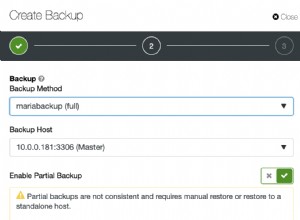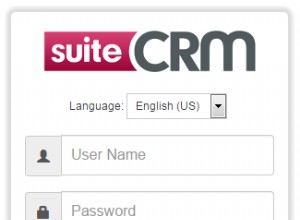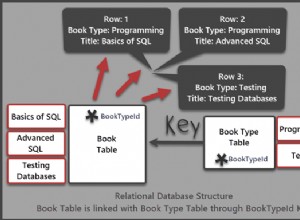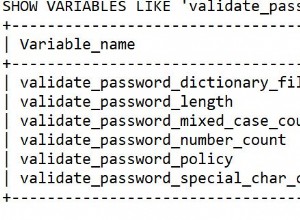Eu tentei algumas versões baseadas no tipo de matriz introduzida pelo JDBC4:Como posso definir um parâmetro String[] para uma consulta nativa?. O problema também é que o Hibernate (mesmo na última versão 4.3.1.final) não funciona com esses novos recursos e me deu a seguinte mensagem de erro
Could not determine a type for class: org.postgresql.jdbc4.Jdbc4Array
Então eu tive que fazer um UserType Específico (baseado em vários artigos no stackoverflow, e outras fontes)
Meu modelo
@Type(type = "fr.mycompany.dao.hibernate.types.ArrayUserType")
private String[] values;
Meu
ArrayUserType public class ArrayUserType implements UserType {
/** Constante contenant le type SQL "Array".
*/
protected static final int[] SQL_TYPES = { Types.ARRAY };
/**
* Return the SQL type codes for the columns mapped by this type. The
* codes are defined on <tt>java.sql.Types</tt>.
*
* @return int[] the typecodes
* @see java.sql.Types
*/
public final int[] sqlTypes() {
return SQL_TYPES;
}
/**
* The class returned by <tt>nullSafeGet()</tt>.
*
* @return Class
*/
public final Class returnedClass() {
return String[].class;
}
/**
* Retrieve an instance of the mapped class from a JDBC resultset. Implementors
* should handle possibility of null values.
*
* @param resultSet a JDBC result set.
* @param names the column names.
* @param session SQL en cours.
* @param owner the containing entity
* @return Object
* @throws org.hibernate.HibernateException exception levée par Hibernate
* lors de la récupération des données.
* @throws java.sql.SQLException exception SQL
* levées lors de la récupération des données.
*/
@Override
public final Object nullSafeGet(
final ResultSet resultSet,
final String[] names,
final SessionImplementor session,
final Object owner) throws HibernateException, SQLException {
if (resultSet.wasNull()) {
return null;
}
String[] array = (String[]) resultSet.getArray(names[0]).getArray();
return array;
}
/**
* Write an instance of the mapped class to a prepared statement. Implementors
* should handle possibility of null values. A multi-column type should be written
* to parameters starting from <tt>index</tt>.
*
* @param statement a JDBC prepared statement.
* @param value the object to write
* @param index statement parameter index
* @param session sql en cours
* @throws org.hibernate.HibernateException exception levée par Hibernate
* lors de la récupération des données.
* @throws java.sql.SQLException exception SQL
* levées lors de la récupération des données.
*/
@Override
public final void nullSafeSet(final PreparedStatement statement, final Object value,
final int index, final SessionImplementor session) throws HibernateException, SQLException {
if (value == null) {
statement.setNull(index, SQL_TYPES[0]);
} else {
String[] castObject = (String[]) value;
Array array = session.connection().createArrayOf("text", castObject);
statement.setArray(index, array);
}
}
@Override
public final Object deepCopy(final Object value) throws HibernateException {
return value;
}
@Override
public final boolean isMutable() {
return false;
}
@Override
public final Object assemble(final Serializable arg0, final Object arg1)
throws HibernateException {
// TODO Auto-generated method stub
return null;
}
@Override
public final Serializable disassemble(final Object arg0) throws HibernateException {
// TODO Auto-generated method stub
return null;
}
@Override
public final boolean equals(final Object x, final Object y) throws HibernateException {
if (x == y) {
return true;
} else if (x == null || y == null) {
return false;
} else {
return x.equals(y);
}
}
@Override
public final int hashCode(final Object x) throws HibernateException {
return x.hashCode();
}
@Override
public final Object replace(
final Object original,
final Object target,
final Object owner) throws HibernateException {
return original;
}
}
E o último, mas menos importante (foi o que eu perdi):quando preciso executar SQL Native Query, tenho que forçar o tipo de parâmetro com a seguinte sintaxe
String[] values = ...
Type arrayType = new CustomType(new ArrayUserType());
query.setParameter("value", values, arrayType);




